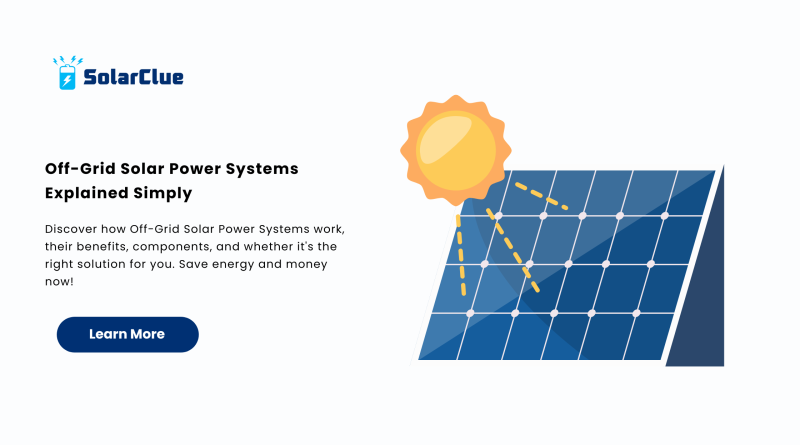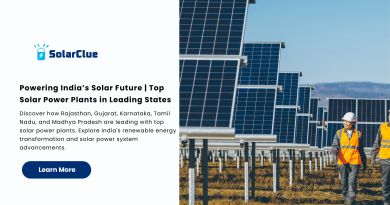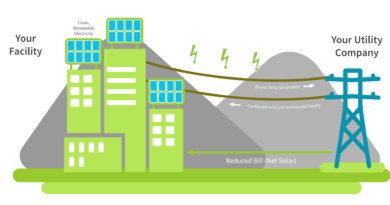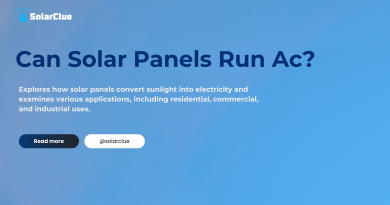Off-Grid Solar Power Systems Explained Simply
When you hear the term Off-Grid Solar Power Systems, it might sound a little technical at first. But don’t worry — we’re breaking it down in a way that’s easy to understand. At its core, an off-grid solar setup is a solar power system that works independently from the traditional electricity grid. That means you generate your own electricity using solar panels, store it, and use it whenever you need — day or night. Perfect for remote areas, adventurous lifestyles, or anyone looking to embrace sustainable living, off-grid solar systems offer the ultimate in energy freedom.
Table of Contents
- 1 What Exactly Is an Off-Grid Solar System?
- 2 Why Choose an Off-Grid Solar Power System?
- 3 Core Components of Off-Grid Solar Systems
- 4 How It Works – Step by Step
- 5 Is an Off-Grid System Expensive?
- 6 Who Should Consider Going Off-Grid?
- 7 Comparing On-Grid vs. Off-Grid Solar Systems
- 8 System Sizing: How Much Solar Do You Need?
- 9 Pros and Cons at a Glance
- 10 Maintenance Tips for Long-Lasting Systems
- 11 Real-Life Use Cases
- 12 Myths vs. Facts
- 13 Where to Buy Trusted Systems?
- 14 Final Thoughts
- 15 FAQs
What Exactly Is an Off-Grid Solar System?
An off-grid solar system is a complete, self-sustaining energy solution. It captures sunlight using solar panels, stores that energy in batteries, and delivers power through an inverter so you can run your home or devices just like you would with grid electricity — minus the monthly bill.
Unlike grid-tied systems that depend on utility power and shut down during blackouts, off-grid systems keep running even when the grid goes dark. That’s why many consider it not just a solution but a smart long-term investment.
Why Choose an Off-Grid Solar Power System?
1. True Energy Independence
Say goodbye to power outages and rising electricity costs. With your own solar energy system, you’re in control.
2. Ideal for Remote Locations
Live in the mountains, countryside, or anywhere far from the city? An off-grid solar system is your best friend.
3. Environmentally Friendly
Using clean solar energy reduces your carbon footprint and helps fight climate change.
4. Cost-Saving in the Long Run
While initial costs might be higher, you save a fortune over time with zero monthly bills and low maintenance.
Core Components of Off-Grid Solar Systems
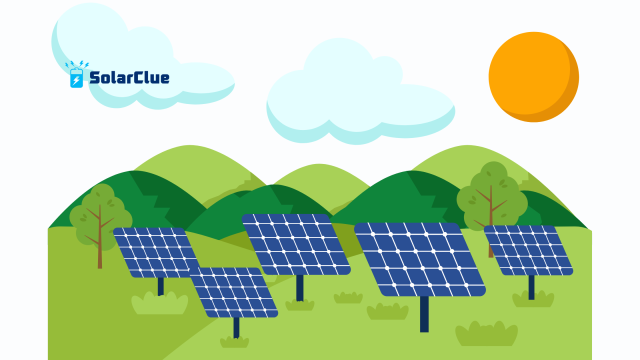
Let’s simplify what you’ll need:
-
Solar panels: Convert sunlight into electricity.
-
Charge controller: Manages energy flow to protect batteries.
-
Battery bank: Stores the energy for nighttime or cloudy days.
-
Inverter: Converts battery power (DC) into usable power (AC).
All these work together to ensure your solar system operates smoothly around the clock.
How It Works – Step by Step
-
Solar panels absorb sunlight during the day.
-
The charge controller regulates power going into the batteries.
-
Batteries store that energy.
-
When you need power, the inverter converts stored DC into AC electricity for your appliances.
It’s that simple — and that powerful.
Is an Off-Grid System Expensive?
It’s true: Off-Grid Solar Power Systems can have higher upfront costs due to the need for quality batteries and storage. But with zero power bills and rising electricity rates, you’ll recoup your investment in a few years. Government subsidies and tax benefits also reduce the total cost.
For top-tier components and complete solutions, check out SolarClue.com — they offer reliable and efficient solar setups for all needs.
Who Should Consider Going Off-Grid?
-
Residents in areas with unreliable power
-
Farmers or ranchers in remote regions
-
Eco-conscious individuals
-
People building cabins or tiny homes
-
Outdoor lovers wanting power during camping or RV trips
If you fit into any of these categories, an off-grid solar system might be exactly what you need.
Comparing On-Grid vs. Off-Grid Solar Systems
| Feature | Off-Grid | On-Grid |
|---|---|---|
| Independence | 100% self-reliant | Depends on utility grid |
| Battery Needed? | Yes | Optional |
| Works During Blackouts? | Yes | No |
| Upfront Cost | Higher | Lower |
| Monthly Bills | None | May still have bills |
System Sizing: How Much Solar Do You Need?
To properly size your off-grid solar system, calculate:
-
Your daily energy use in kWh
-
Available sunlight hours in your area
-
Number of appliances you want to power
-
Desired days of autonomy (power during cloudy days)
Once you know this, you can choose how many solar panels and batteries you’ll need.
Pros and Cons at a Glance
Pros:
-
No electricity bills
-
Great for remote areas
-
Cleaner, greener energy
-
Long-term cost savings
Cons:
-
Higher initial setup cost
-
Battery replacement every 5–15 years
-
Limited scalability for high-energy homes
Maintenance Tips for Long-Lasting Systems
-
Clean your solar panels monthly for maximum efficiency
-
Check battery health every few months
-
Keep wiring and components dust-free
-
Annual professional inspection for safety
Real-Life Use Cases
-
A farm in Rajasthan powers its irrigation system using off-grid solar power systems.
-
An eco-resort in Kerala uses solar energy to run its entire premises.
-
Adventure travelers power their vans with compact solar panel systems.
Stories like these show just how versatile and life-changing this technology can be.
Myths vs. Facts
Myth: Off-grid solar is only for tech experts.
Fact: Modern kits are plug-and-play and easy to monitor.
Myth: You can’t run big appliances like ACs.
Fact: With the right inverter and battery size, you can run anything — even heavy-duty appliances.
Where to Buy Trusted Systems?
For dependable, long-lasting products, visit SolarClue.com. They offer a full range of solar power system kits, expert advice, and after-sales service.
For helpful guides and updates, head over to their blog: blog.solarclue.com
Final Thoughts
Off-Grid Solar Power Systems are the future — cleaner, smarter, and more sustainable. Whether you live remotely or just want to take control of your energy use, these systems offer unbeatable freedom. With the right planning and quality equipment, anyone can go solar and say goodbye to grid dependency.
Ready to power your life with the sun? Explore top-tier products and step-by-step guidance at SolarClue.com — it’s time to brighten your world naturally.
FAQs
1. How many solar panels do I need for an off-grid setup?
That depends on your daily energy use. A typical home using 10kWh/day may need around 15–20 solar panels.
2. Can I run air conditioners with off-grid systems?
Yes! With a properly sized solar system and inverter, AC units work flawlessly.
3. Is off-grid solar cheaper in the long run?
Absolutely. Once installed, you pay nothing for power, and costs are recouped within years.
4. Are government subsidies available?
Yes. Various subsidies and incentives are offered. Check with local DISCOMs or visit SolarClue.com for updates.
5. How long do off-grid systems last?
Solar panels can last 25+ years. Batteries vary but generally need replacement every 5–15 years based on usage and type.
If you’re ready to harness the sun and take full control of your energy, there’s no better place to start than SolarClue.com. Visit now and begin your journey toward energy independence and a greener tomorrow 🌞

